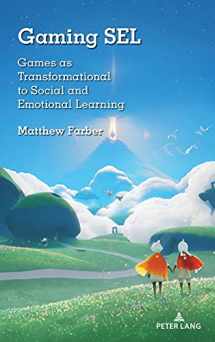
Gaming SEL
Book details
Summary
Description
Review
“Gaming SEL takes us into a fascinating and resourceful journey exploring the development of social and emotional skills (more specifically in children) and the ways in which games can support social and emotional learning (SEL). Matthew Farber summarizes the results of empirical research and gathers the expertise of dozens of academics, researchers, educators, and game designers to digest it all in a very approachable way for the reader. Using a multitude of examples from board games to video games, he also offers a compelling guide for harnessing the emotional and engaging power of games for SEL. This book is a must-read for teachers, parents, and anyone interested in understanding why and how games can foster a growth mindset, allow us to experiment with emotions and interpersonal relationships safely, and support our overall emotional well-being.”―Celia Hodent, PhD in psychology, game UX consultant; author of The Gamer’s Brain and The Psychology of Video Games
“Matthew Farber's book gives the reader a compelling and nuanced tour of a very important subject―social and emotional learning and the role that games can play in supporting it. I would encourage anyone looking for a comprehensive and accessible introduction to this topic to read this book! I particularly appreciate Farber's broad knowledge of game design efforts in this area, as well as his grasp of related literature.”―Katherine Isbister, Professor of Computational Media, University of California Santa Cruz; author of How Games Move Us: Emotion by Design
“Games can provide a context for exploration, experimentation, and perspective-taking―a playground for human development that can help us better understand ourselves and each other. In this timely and thoughtfully researched book, Farber presents rich evidence that games build resilience and emotional well-being, and provides a robust catalogue of ideas, examples, and references to explore.”―Michael Preston, Executive Director, Joan Ganz Cooney Center at Sesame Workshop
“Matthew Farber delivers a much-needed resource for those interested in finding ways to meet youth where they are. Games are undeniably a meaningful part of young people’s lives, and identifying ways games can offer pathways to growth and self-awareness is gold! His understanding of social and emotional learning and the games industry provides a unique insight into how games can contribute to the development of thriving global citizens.”―Susanna Pollack, President, Games for Change
“Kudos to Matthew Farber for synthesizing so much research, contemporary evidence, and expert voices into a book that is both relevant, provocative, and thoughtful. Emotions are the gatekeepers of attention, motivation, and cognition; through technology, young people make sense of and contribute to their world. This book explores the present and possible roles for technology to play in this space.”―Mark Sparvell, Education Marketing Director, Microsoft
Games enable children to practice emotions in spaces that are free from actualized consequences. With thoughtful guidance, games can help children manage emotions, perspective-take, demonstrate empathic concern, and exhibit prosocial behaviors.
Emerging research suggests that these competencies―also known as social and emotional learning (SEL) skills―are, in fact, teachable. In Gaming SEL: Games as Transformational to Social and Emotional Learning, Matthew Farber investigates the rich opportunities games have in supporting SEL skill development. Experts from the fields of education, game development, and SEL―including folks from CASEL, the Fred Rogers Center, Greater Good in Education, iThrive Games, Minecraft Education, and UNESCO MGIEP―share advice.
Games themselves cannot be responsible for children’s learning. Having a supportive educator or caregiver guiding experiences can be crucial. This book also includes recommendations for embedding games in classrooms in ways that support meani


We would LOVE it if you could help us and other readers by reviewing the book
Book review



